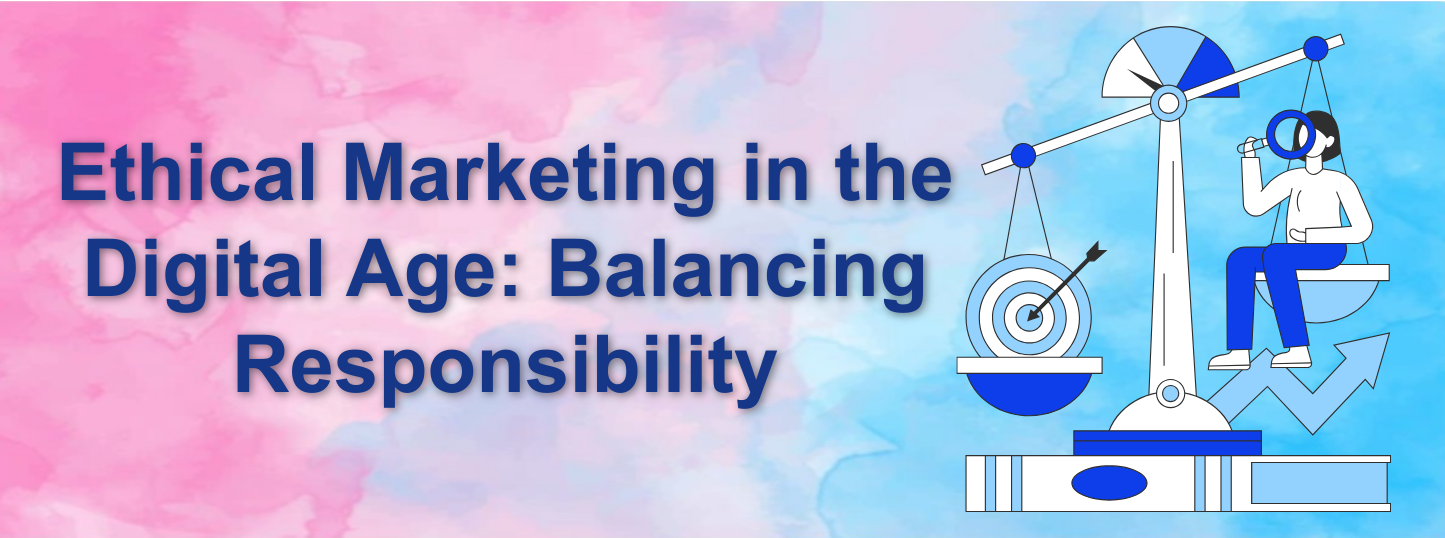Ethical Marketing in the Digital Age: Balancing Responsibility

Introduction
In today’s digital world, businesses have greater access to consumers than ever before. While this offers tremendous opportunities for growth, it also brings a set of ethical challenges. Ethical marketing is no longer just an option; it’s a necessity. Consumers are becoming increasingly conscious of corporate practices and expect brands to be socially responsible. Striking a balance between profit and responsibility is the key to long-term success. This article explores the significance of ethical marketing, key strategies to implement it, and how businesses can maintain credibility while maximizing profits.
What is Ethical Marketing?
Ethical marketing refers to promoting products and services in an honest, transparent, and socially responsible manner. It prioritizes consumer trust, fairness, and corporate integrity over misleading tactics and profit-driven exploitation. Ethical marketing not only complies with legal standards but also aligns with moral values, ensuring that businesses contribute positively to society.
The Importance of Ethical Marketing in the Digital Age
1. Building Consumer Trust
Consumers today are more informed than ever, thanks to the internet and social media. They expect transparency and authenticity from brands. Ethical marketing fosters trust, leading to long-term customer relationships and brand loyalty.
2. Strengthening Brand Reputation
Companies known for ethical practices enjoy stronger brand reputations. A positive reputation attracts not only customers but also investors and talented employees who want to be associated with a responsible company.
3. Compliance with Regulations
Many countries have strict regulations against deceptive advertising, data misuse, and unethical labor practices. Ethical marketing ensures that businesses comply with these laws, avoiding legal repercussions and financial penalties.
4. Enhancing Customer Engagement
Consumers engage more with brands that share their values. Ethical market enables businesses to connect with audiences on a deeper level, fostering loyalty and advocacy.
Key Strategies for Ethical Marketing
1. Transparent Advertising and Honest Messaging
Avoid misleading advertisements, exaggerated claims, or hidden charges. Instead, provide clear and accurate information about products and services. Ensure that promotional materials align with what the brand genuinely offers.
2. Data Privacy and Protection
With growing concerns over data privacy, businesses must handle customer data responsibly. Implementing secure data protection measures and being transparent about data collection policies can reinforce trust.
3. Social Responsibility Initiatives
Brands that engage in corporate social responsibility (CSR) initiatives—such as environmental sustainability, fair labor practices, and community support—enhance their credibility. Consumers are more likely to support businesses that contribute to social causes.
4. Avoiding Exploitative Practices
Ethical marketing discourages manipulative tactics such as false urgency (e.g., fake countdown timers) or guilt-based advertising. Instead, focus on genuine value and customer empowerment.
5. Fair Pricing and Ethical Production
Ensure fair pricing strategies that do not exploit vulnerable consumers. Additionally, adopting ethical sourcing and fair labor practices can significantly impact brand perception.
6. Engaging in Inclusive Marketing
Diversity and inclusion should be at the forefront of marketing campaigns. Representing different cultures, genders, and abilities in advertisements promotes equality and resonates with diverse audiences.
7. Responsible Influencer Marketing
Collaborate with influencers who align with the brand’s ethical values. Ensure that endorsements are genuine and not misleading. Transparency in sponsored content builds authenticity.
Challenges in Ethical Marketing
While ethical market is essential, it comes with challenges:
- Higher Costs: Implementing ethical business practices can be expensive, especially for small businesses.
- Consumer Skepticism: Some consumers doubt the sincerity of brands’ ethical claims, making it necessary to demonstrate authenticity consistently.
- Competitive Pressure: Businesses operating in highly competitive markets may struggle to balance ethical marketing with aggressive growth strategies.
The Future of Ethical Marketing
As digital consumers become more discerning, ethical marketings will continue to evolve. Brands that prioritize ethical practices will enjoy sustained growth, while those that engage in misleading tactics risk reputational damage. The future of marketing lies in honesty, transparency, and social responsibility.
Conclusion
Balancing profit and responsibility in the digital age is challenging but essential. Ethical marketing fosters trust, enhances brand reputation, and ensures long-term business success. By prioritizing transparency, social responsibility, and fair practices, businesses can create meaningful relationships with their customers while achieving financial success.
USEFUL LINKS:
https://awaraj.com/direct-marketing/
https://awaraj.com/seo-services/
https://awaraj.com/ai-powered-seo-revolutionizing-digital-marketing-in-2025/
https://awaraj.com/top-digital-marketing-strategies-startups-2025/

